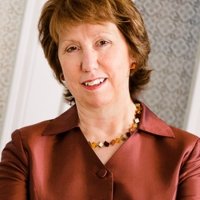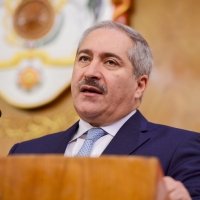The Right Honorable Catherine Ashton in Conversation with the Honorable Nasser Judeh
The Wilson Center was honored to host a dialogue between Baroness Cathy Ashton, former EU Representative for Foreign Affairs and current member of the British House of Lords, and the Honorable Nasser Judeh, Senator in Jordan's Parliament and former Foreign Minister, on the present and future of Euro-Mideast relations. Europe has a rich historical relationship with the Middle East marked by shared values and common interests in maintaining peace and security in the region, as well as promoting mutually beneficial socio-economic policies. The discussion focused on a wide array of complex issues; geopolitical challenges and opportunities for Euro-Mideast diplomacy, economic development, trade and investments, the global refugee crisis, Arab-Israeli peace, and inter-regional security cooperation. Additionally, the talk underscored the geostrategic importance of Jordan in relation to its neighbors and the world, the conditions and implications of Jordan’s current trajectory, and various factors imperative to Jordan’s future success.
Selected Quotes
Honorable Catherine Ashton
“The big question is how to support people that feel that they have to get out. Most people want to stay at home. People don’t leave their own nation easily or willingly. They do it often in desperation, either because of a conflict, or because of what you might call politics, or because they don’t see economic opportunity.”
Honorable Nasser Judeh
“Jordan does its fair share in the context of the international community, but I think the international community has to do its fair share in supporting countries like Jordan. Small countries that happen to be geographically contiguous to conflict zones, and that are shouldering the responsibility on behalf of the rest of the international community.”
“It’s very important that you look at Jordan in that context – a modern, forward-looking country, a highly educated society, very young, looking for opportunities, facing serious economic challenges, trying to be a voice of reason in a volatile region, and, in a lot of cases, succeeding.”
“The problem with all the Middle East peace initiatives, whether they were U.S. initiatives, European initiatives, local initiatives, regional initiatives, is that they never cross the finish line.”
“Our region is of geostrategic importance to the rest of the world. We all know that. But it’s a two-way street. And in this world that we live in today, it’s very important to have it as a two-way street.”
Speakers

Former Vice President of the European Commission and former High Representative of the EU for Foreign Affairs and Security Policy

Hosted By

Global Europe Program
The Global Europe Program is focused on Europe’s capabilities, and how it engages on critical global issues. We investigate European approaches to critical global issues. We examine Europe’s relations with Russia and Eurasia, China and the Indo-Pacific, the Middle East and Africa. Our initiatives include “Ukraine in Europe”—an examination of what it will take to make Ukraine’s European future a reality. But we also examine the role of NATO, the European Union and the OSCE, Europe’s energy security, transatlantic trade disputes, and challenges to democracy. The Global Europe Program’s staff, scholars-in-residence, and Global Fellows participate in seminars, policy study groups, and international conferences to provide analytical recommendations to policy makers and the media. Read more


Middle East Program
The Wilson Center’s Middle East Program serves as a crucial resource for the policymaking community and beyond, providing analyses and research that helps inform US foreign policymaking, stimulates public debate, and expands knowledge about issues in the wider Middle East and North Africa (MENA) region. Read more
